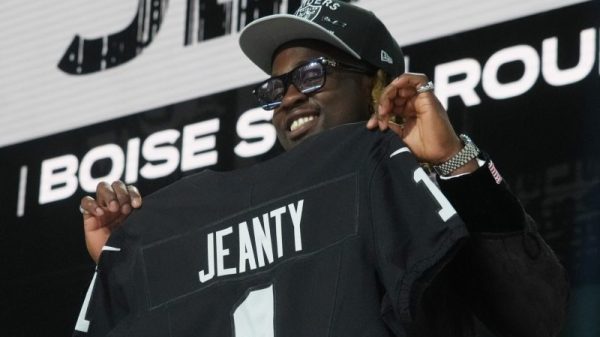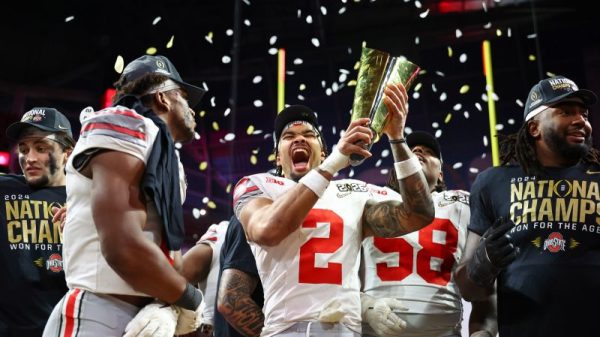
- In the Eastern District of Kentucky, Judge Karen Caldwell ruled that the plaintiffs didn’t prove there were enough female students at or admitted to UK ‘actually able to compete at a varsity level.’
- Social justice in sports expert and Ithaca College professor Ellen Staurowsky, Ed.D., thinks this lawsuit against UK could have serious implications for the future of Title IX.
A gender discrimination lawsuit against the University of Kentucky could have national implications after its latest filing was made to the Sixth Circuit Court of Appeals on Thursday evening.
Former UK students Ala Hassan and Lisa Niblock filed a federal lawsuit in 2019 alleging the school violated Title IX by not providing equal opportunities for women to participate in varsity sports. Last fall, U.S. District Judge Karen Caldwell ruled in the Eastern District of Kentucky that the university was not in violation of the gender-equity law. Iowa-based attorney Lori Bullock filed a notice of appeal to the Sixth U.S. Circuit Court of Appeals in February, and UK’s lawyers submitted their appellee’s brief Thursday, according to online court records.
In an appellee’s brief, the defendants are tasked with outlining why the lower court’s decision should stand. They asserted that 46-year-old guidance handed down by the U.S. Department of Education regarding Title IX compliance, otherwise known as the three-part test, ‘is not entitled to judicial deference, contradicts the statutory text, and conflicts with the regulations, it should have no applicability to this case.’ Should the court decide the 1979 policy interpretation applies to this case, however, UK argues that it still complies with Title IX.
If the Sixth Circuit Court of Appeals decides to throw out the three-part test, it could devastate the anti-discrimination law.
‘In this climate, I think these kinds of decisions, the potential impact of them is quite serious,’ Ellen Staurowsky, Ed.D., Ithaca College professor and social justice in sports expert, told The Courier Journal. ‘If we put that together with the reductions in workforce with the Office for Civil Rights in the Department of Education, the emphasis that’s being made on speeding up reviews, the Trump administration is talking that language. …
‘So the potential implications of this are big.’
Bullock did not immediately respond to request for comment. UK spokesperson Jay Blanton said the university would ‘let the brief speak for itself.’
What is the three-part test?
Under the Department of Education’s three-part test, a school can be in compliance with the participation aspects of Title IX in any one of the following ways:
— The number of male and female athletes is substantially proportionate to their respective enrollments; or
— The institution has a history and continuing practice of expanding participation opportunities responsive to the developing interests and abilities of the underrepresented sex; or
— The institution is fully and effectively accommodating the interests and abilities of the underrepresented sex.
UK’s legal counsel tried multiple times during the lower court proceedings to have the three-part test thrown out. Lawyers most recently cited a Supreme Court ruling from June between Loper Bright Enterprises and Raimondo, which is also cited in Thursday’s brief. The decision made in favor of Loper Bright overturned a 40-year precedent known as “the Chevron doctrine” directing courts to defer to government agency interpretations of ‘ambiguous’ laws.
How was the three-part test previously applied to this case?
Caldwell declined to discard the three-part test in the Eastern District of Kentucky but ultimately ruled in UK’s favor. It is unclear whether the Loper Bright case can be applied to the Department of Education and the Office of Civil Rights’ guidance on Title IX. Staurowsky told The Courier Journal that ‘the question would be did (the Department of Education and Office for Civil Rights) exceed its authority in issuing the regulations as they are. I’m not sure how this is going to play out.’
It is also unclear whether a judge would be receptive to a precedent set after this particular lawsuit was filed in 2019.
In the Eastern District of Kentucky, Caldwell ruled that UK did not meet two parts of the three-part test used to measure participation opportunities in accordance with a 1979 interpretation of Title IX.
Caldwell wrote in her ruling that the plaintiffs had proven UK “does not provide females (sic) students with intercollegiate varsity participation opportunities in numbers substantially proportionate to their respective enrollment.” Women made up 58.9% of UK’s enrollment during the 2023-24 academic year. But less than 51% of UK’s varsity athletes participate in women’s sports, according to the school’s most recent NCAA financial report.
Caldwell also found UK didn’t prove “either a history or a continuing practice of program expansion that is demonstrably responsive to the developing interests and abilities of its female students,’ nor did it ‘present evidence of a plan of program expansion pursuant to which the committee regularly reviews multiple measures of developing interest and ability, like those reviewed for [STUNT], to expand its varsity participation opportunities for females.”
Ultimately, though, Caldwell ruled that the plaintiffs did not prove there were enough female students at or admitted to UK who are ‘actually able to compete at a varsity level in a sport and that there are enough of them to form a team.” She also wrote that the plaintiffs could not prove UK failed to address unmet student interest in the sports they argued it should add: women’s lacrosse, field hockey and/or equestrian.
Regarding student ability, Caldwell wrote that ‘neither the club lacrosse nor field hockey club teams has won any championships or otherwise obtained recognition for the skill level of the team or its individual players.” The equestrian team has won accolades at the club level (including a national championship in 2008), but most of the club’s team members “fall below the skill level required for a varsity team,’ Caldwell wrote.
How this lawsuit could have national impact on Title IX
Staurowsky has been following this case for a while. It raises fundamental questions about what Title IX compliance looks like half a century after the law’s passage in 1972. Staurowsky believes the plaintiffs effectively laid out how UK failed each prong of the three-part test — by a concerningly wide margin — in their initial complaint and appellee’s brief two months ago.
Regarding the assertion from UK (which it doubled down on in its latest filing) and Caldwell that club participation alone doesn’t translate to a full varsity team, Staurowsky said “no kidding.”
The standard, Staurowsky told The Courier Journal, isn’t supposed to be “plaintiffs deliver a varsity sport, and then we say, ‘You can have it.’” The standard, she added, is meant to focus on whether an institution is engaging in sex discrimination. Most Division I programs, regardless of sport, don’t recruit their campus anyway, instead looking nationwide (if not internationally) for talent.
“This determination that somehow the plaintiffs hadn’t met the burden of demonstrating whether or not they had enough viable candidates,” Staurowsky said, “I think the logic of that really, really should be challenged. And its potential impact would be considerable.”
If the Sixth Circuit Court of Appeals judge decides to do away with the three-part test, it could spell disaster for the anti-discrimination law. The three-part test has been used to evaluate Title IX compliance for nearly 50 years. Without it, Title IX could be rendered ineffective.
This comes while Title IX is seemingly under siege by various entities and government officials.
The Trump administration recently announced its “Special Investigations Team” to speed up the process of Title IX investigations on the heels of halving the U.S. Department of Education’s staff and laying off at least 43% of the Office for Civil Rights. For years, politicians have used transgender women to fearmonger in the name of “protecting” women’s sports. And even as the NCAA seeks congressional intervention with NIL and revenue sharing, Staurowsky said, the governing body uses Title IX as a smokescreen to avoid labeling athletes as “employees.”
“These large pieces have slowly been getting put into place,” Staurowsky said, “in very damaging ways.”
Reach college sports enterprise reporter Payton Titus at ptitus@gannett.com, and follow her on X @petitus25.





























